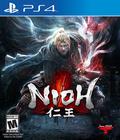Buy Nioh
The popularity of the Dark Souls franchisehas led to tons of copycats, but none of them have managed to do more than feel slightly reminiscent. Perhaps that is what makes Nioh stand out. While it takes plenty of cues from Souls, Nioh is a damn good game on its own merit, and it's probably the first title to challenge From Software's behemoth on its own territory and succeed.
Nioh is set in the 1500s. Players follow a pirate named William, who's based on the historical figure of William Adams. England defeated the Spanish Armada using a substance called Amrita, which is found most prominently in Japan. William's one of the few who knows how to find it, and he's jailed in the Tower of London for his troubles. He escapes with help from his loyal guardian spirit, but the spirit is captured during the jailbreak. William travels to Japan to save his lost ally and discover the secrets of Amrita.
The plot is pretty light, and it feels like a stylish samurai film. The cool environments and stylish boss fights do the job well enough, but I didn't feel too strongly about the characters, and their motivations never rang too strong. You're unlikely to find as much in-depth lore and world-building here as in a Souls game, which makes sense since Nioh's first priority is the combat.
In terms of gameplay, Nioh is something like Ninja Gaiden meets Dark Souls. The structure is taken from the Souls franchise. You begin at a shrine, similar to the bonfires in Souls, and you make your way through the levels trying to find shortcuts, more shrines, and bosses. The game is structured around missions rather than a linear plot like Souls, so while it may feel more disjointed, it fosters replayability and allows players to tackle optional hard missions or side-quests. There's even post-game content that lets you take on super-punishing missions if you're interested in a real challenge.
Combat in Nioh is so fast and brutal that even Bloodborne can't compare. Combat feels closer to an action game than the weighty and heavy combat in the Souls franchise. Your combos are customizable, and you unlock various moves that are slotted into specific actions. For example, you can end your combo with a powerful slash attack or a kick that stuns and weakens enemies. Rather than a huge variety of weapon types, you have five — axes, dual swords, kusarigama, spears and swords — in addition to ninjutsu tools like shuriken and onmyo magic.
The combat system revolves heavily around the stances. At any time, you can swap between four stances: sheathed, high, medium and low. Sheathed means your weapon isn't drawn, but certain moves require it. High stance sacrifices speed for additional damage, medium stance is the default and balances speed and power, and with low stance, you lose damage but are faster. All three stances have associated moves and abilities, and you can swap between them at will, including mid-combo. If you're overwhelmed by an enemy, you can change to a more suitable stance.
Similar to the Souls games, Nioh has a stamina gauge, or rather a ki gauge. Attacks use up your ki. If you reach zero ki, then you'll be stunned and vulnerable to enemy attack. Enemies function under the same rules, so it's possible to let your enemies wear themselves down before you unleash a combo that drains the rest of their ki and leaves them vulnerable to a takedown.
The other major component of combat is Ki Pulse. When you use up stamina, part of the bar glows white. If you correctly time the press of the stamina button, it'll replenish so you can halve your stamina usage without having to wait. As the game advances, you'll unlock upgrades, such as the ability to perform Ki Pulse by dodging.
Distinct to Nioh is the Living Weapon system. William can access guardian spirits who provide passive bonuses in combat. The most important of these is Living Weapon, a super mode where William's spirit transforms into a weapon that he can use. During that time, William is immune to damage, but the damage he deals and takes gradually drain the weapon's meter. When it runs out, he goes back to normal. As with Souls games, any death leaves behind your collected Amrita, which is used for leveling. Your guardian will protect your corpse when you die, but it means that your recovery attempt comes at a significant handicap. You can recall your guardian spirit from any shrine, but in doing so, you forfeit the ability to recover your lost goods.
I was unsure about the Living Weapon system, but it's not an instant-win button. It's merely an advantage, and it charges slowly enough that you'll be cautious about when and where you use it. Ultimately, I think it's a strong addition, but it works better for Nioh than it would in other games.
Unlike the Souls games, theloot system is probably more akin to Diablo. Weapons are randomly dropped from chests and by enemies. The weapons are randomized loot appropriate for the area, but they come in different rarities and with different abilities. Most of what you'll find is simple vendor trash, but every so often, you'll find color-coded rare loot that is stronger than normal. Sometimes, you may find an item that completely changes your gameplay. Early versions of Nioh had a durability system, but that has been replaced by a far greater familiarity system. The more you use a weapon, the stronger it gets, so you're encouraged to stick with a reliable weapon.
Perhaps the biggest core difference between Nioh and Dark Souls is that this title is more comfortable with the player gradually increasing in power. There are dozens of interlocking systems, and each makes William more powerful or makes things easier for him. Almost everything you do will give you some small boost. William can trade Amrita for additional stats, and skill points unlock new abilities and moves, though some are gated by story progress. Weapons that you use will gradually gain familiarity. You can complete special achievements that unlock reputation points for even more goodies.
It's a very different feel from Souls. Rather than putting the onus on the player to improve, Nioh gradually helps them out. The game still asks for plenty of skill from the players, but it slowly eases the pressure. There's also multiplayer, where you can ask another player to help you, which is an easier and friendlier approach than Souls.
The environments in Nioh are as deadly as the enemies. Every stage is full of deathtraps that require you to be careful. Sometimes, you must contend with enemy ambush locations, such as groups of archers on rooftops. Other times, there are pressure plates, collapsing roofs, deadly cliffs, and other tricks that are just waiting to kill you. There are lots of hidden nooks and crannies that contain loot drops, rare enemies, collectible Kodamas, or shortcuts to the last shrine.
Nioh's level design is not quite as tight as Souls. It's still very good, but it feels slightly bloated in places. The need for randomized loot and collectibles makes areas feel less distinct. Most levels are fun to play and explore, but they lack the subtle environmental storytelling that really shines in Souls.
You'll probably die a lot in Nioh. I'm not prepared to call it harder than Dark Souls, but it's difficult in a different way. Death comes quickly to the unprepared, and early on, basic foes can kill you in one or two hits. As the game progresses and your stats and skills improve, that will occur less frequently. Nioh will punish you for mistakes, aggression, or failure to read enemy tells. You should expect to reach a boss and die in a heartbeat. The important thing is that Nioh rarely feels unfair. There are occasional cheap shots, but generally, when you die, it'll feel frustrating but fair.
Nioh is a really good-looking game. The visuals are strong, with great enemy design and smooth animations. A particularly great element of the game is that it offers multiple visual options. You can choose Action mode, which locks the frame rate, or Movie mode, which has better resolution but at a cost to frame rate. There's also a Variable mode that is somewhere in between. This allows players to choose what they want to prioritize, which is common in PC gaming but unheard of on consoles. However, it's really Action mode or bust. The game has enough frame-demanding inputs that you'll want to prioritize frame rate. The voice acting is pretty solid, a mix of English and Japanese that fits the setting well, though I found the music to be largely unmemorable.
Nioh is a surprise delight. In a world of clones, it's great to find a Dark Souls homage that manages to be its own game and stands on its own merits. It's fast-paced, fun, brutal and full of enough mechanics and gameplay features that you could play it for months. You don't need to be a Souls fan to enjoy Nioh'sexcellent gameplay. The story is a little thin, and the environments aren't always great, but if you're looking for fast-paced samurai action or seeking a challenge, Nioh is the game for you.
Score: 9.0/10
More articles about Nioh











 Nioh is a dark, samurai-centric action RPG where players will traverse war-torn Japan as William, a blonde-haired swordsman whose background as a fierce warrior and seasoned knowledge of the blade allows him to survive in the demon-plagued land of the samurai.
Nioh is a dark, samurai-centric action RPG where players will traverse war-torn Japan as William, a blonde-haired swordsman whose background as a fierce warrior and seasoned knowledge of the blade allows him to survive in the demon-plagued land of the samurai.















































